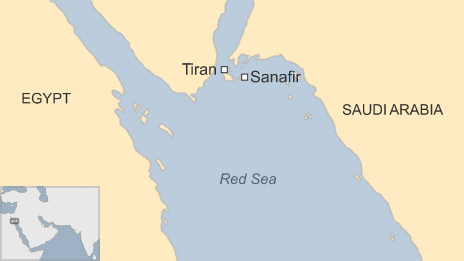Egypt unrest: Police disperse anti-Sisi protest in Cairo
- Published
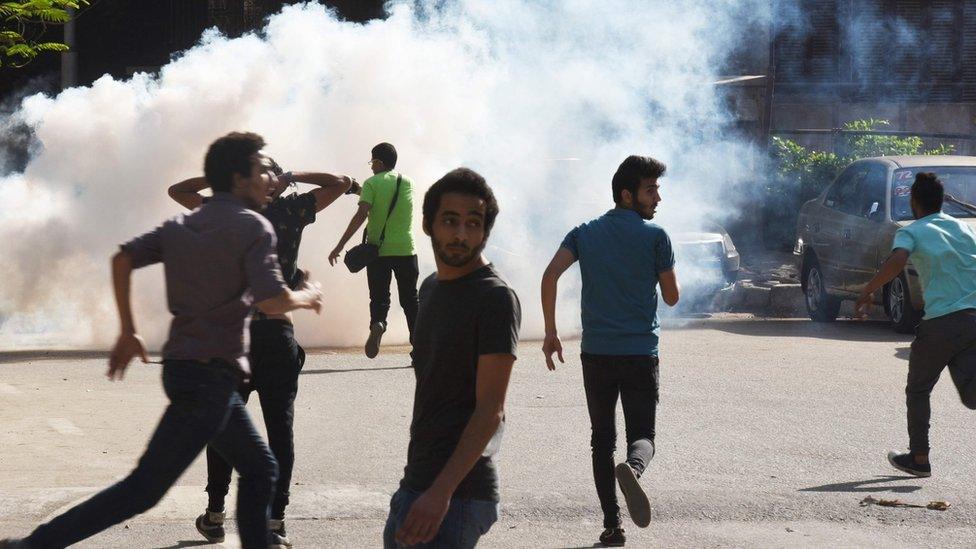
The unrest comes as President Abdul Fattah al-Sisi faces mounting criticism
Riot police have fired tear gas and birdshot to disperse anti-government protesters in Egypt's capital, Cairo.
Hundreds gathered in the Dokki area to call on President Abdul Fattah al-Sisi to resign over his decision to hand back two islands to Saudi Arabia.
The clash took place despite police and soldiers being deployed across the city to prevent planned demonstrations.
Dozens of arrests were also reported, as officials said they would confront any attempt to disturb public order.
Mr Sisi, who has cracked down on all dissent since leading the military's overthrow of President Mohammed Morsi in 2013, said on Sunday that "evil" forces were conspiring to destabilise the state.
'Sign of panic'
About 500 people, led by prominent activists, gathered in Mesaha square in Dokki on Monday in defiance of the warnings against unauthorised demonstrations.
They chanted "leave, leave" and "bread, freedom, the islands are Egyptian" until police wearing full riot gear arrived and started firing tear gas and birdshot.
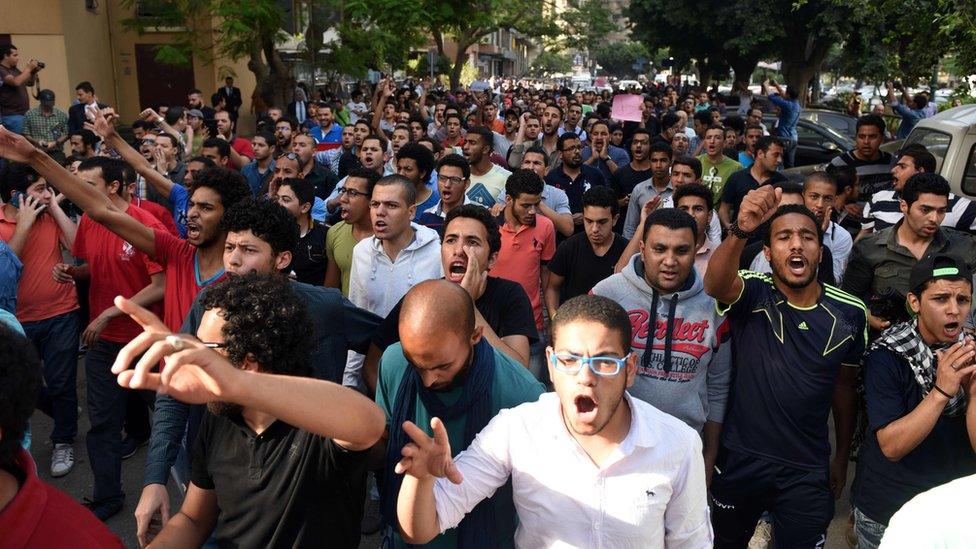
Hundreds of people defied the government to protest in Cairo's Dokki district
A number of protesters, along with several journalists, were subsequently detained.
A leading human rights group separately said it had documented 133 arrests in just three hours, including 11 journalists.
Earlier, riot police, armoured vehicles, water cannon and troops were deployed at key locations across Cairo, including Tahrir Square, the focal point of the 2011 uprising. Gathering points proposed by protest organisers were sealed off.
Supporters of Mr Sisi, in stark contrast, were allowed to gather freely, reports the BBC's Orla Guerin in Cairo. Small numbers danced in the streets, carrying banners showing the president.
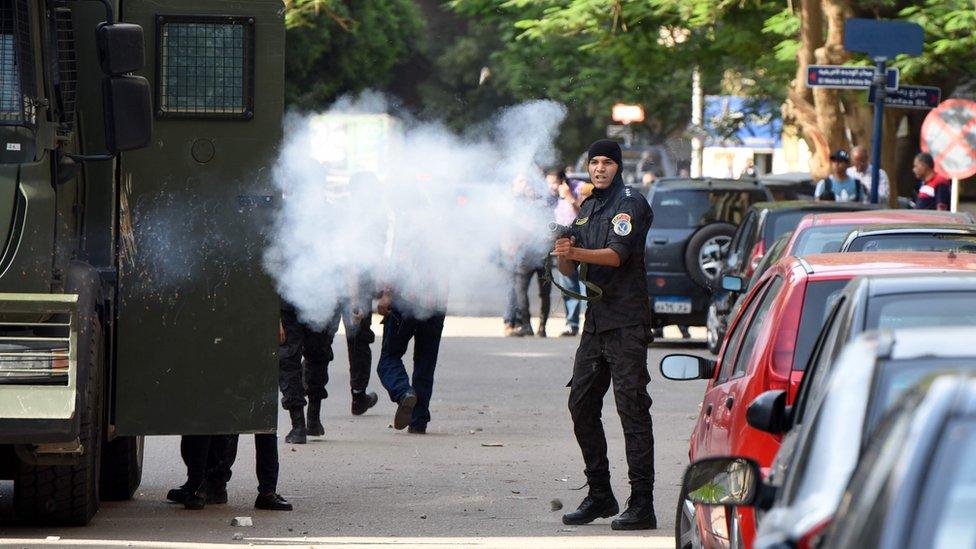
But riot police moved in quickly, dispersing the crowds with tear gas and birdshot
Interior Minister Magdi Abdul Ghaffar warned that security forces would "confront with extreme rigour any attempt to disturb public order" on Monday, which is also a national holiday that marks the anniversary of Israel's withdrawal from the Sinai Peninsula in 1982.
In his speech on Sunday, Mr Sisi warned that there were "people calling once again for damage to [Egypt's] security and stability."
The president's decision earlier this month to cede control over the Red Sea islands of Sanafir and Tiran sparked widespread criticism.
He was forced to defend the move, saying the islands had always belonged to Saudi Arabia.
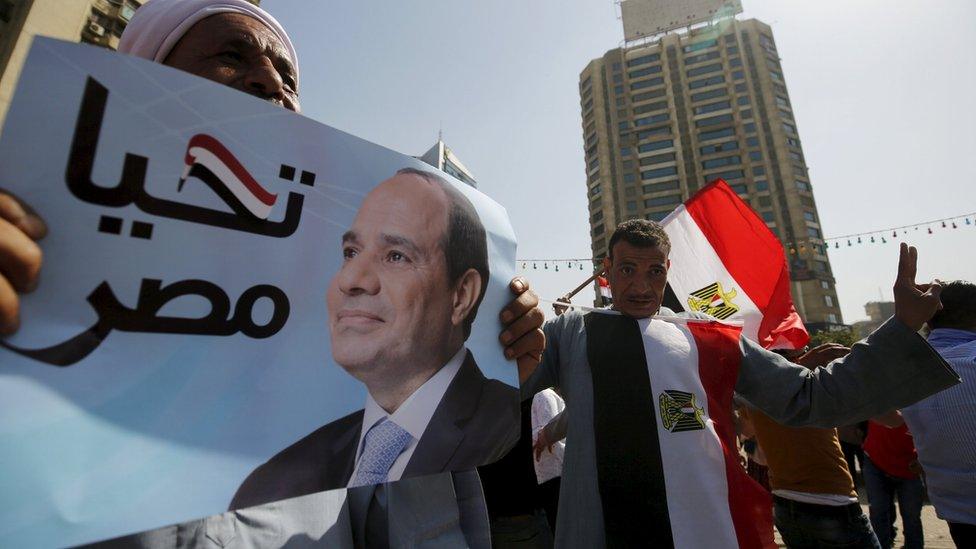
Supporters of President Sisi were, in contrast, allowed to gather freely in Cairo
Egyptian troops have been stationed on the islands since 1950 at the request of Saudi Arabia. Critics, though, have objected to the way Mr Sisi has handed them back, saying it is unconstitutional.
Our correspondent says unrest has been building over a range of issues, including police brutality and the faltering economy.
Some analysts - and activists - say the massive security operation is a sign of panic by the government, she adds.
As commander-in-chief of the armed forces in 2013, Mr Sisi led the military's overthrow of President Mohammed Morsi following mass protests against his rule.
Since then, more than 1,000 people have been killed and, in a sweeping crackdown on dissent, 40,000 are believed to have been jailed, most of them supporters of Morsi's now outlawed Muslim Brotherhood.

Why the Red Sea islands matter
Sanafir and Tiran are islands, lie about 4km (2 nautical miles) apart in the Red Sea. Tiran sits at the mouth of the Gulf of Aqaba, on a strategically important stretch of water called the Strait of Tiran, used by Israel to access the Red Sea
The islands are uninhabited, apart from Egyptian military personnel and multi-national peacekeepers since 1982
The islands belong to Saudi Arabia, which let Egypt guard them since 1950
Israel captured the islands in 1956 and 1982, subsequently returning them to Egypt both times
Egyptian President Abdul Fattah al-Sisi was criticised for "selling" Egyptian territory after deciding in April 2016 to hand the islands back to Saudi Arabia
